Colombia. Music that Heals and Reconciles.
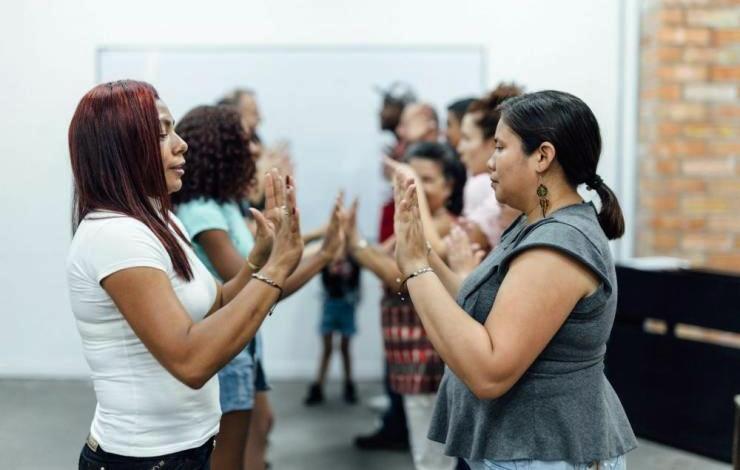
In Colombia, the Medellín Philharmonic Orchestra has brought together the victims of armed conflict and various armed groups to learn music, create a choir and compose songs. Through music, they are healing the scars left by fifty years of war.
Luz Mery González Caicedo, who died last August, was one of the women whose soul was wounded by the war in Colombia. She bore the scars on her body. But her spirit remained strong. She was a physically fragile woman, but she had all the strength of God to bear the fruits of peace where war had sown pain, poverty, and death. She surrounded herself with women and took her place among them. She was a leader among her companions, a selfless human rights defender, and a tireless fighter for the vulnerable communities of her hometown of Medellín.
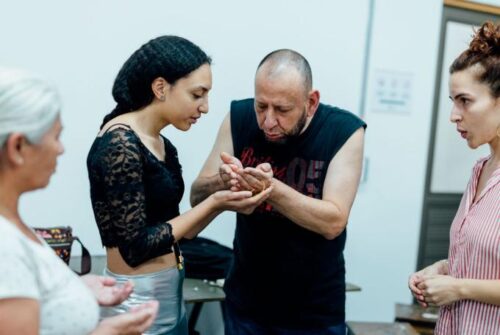
The Reconciliation and Peace Choir members learn the breathing techniques necessary for singing.
Intelligent, humane, and sensitive, with a vocation for service, she put all her energy and faith into regenerating the victims of war. She was kind, prepared, humble, and willing. She loved without measure, and she also had the ability to carry on when she was abandoned, for example when she was not given a steady job. Luz Mery Caicedo’s most acute pains were those that the armed men inflicted on her – suffering at the sight of so many Colombian children dying, pains that never stopped hurting her deeply, both when she closed her eyes and when she woke up. Luz Mery Caicedo’s transition from pain to the promotion of peace was manifested and developed in the Reconciliation and Peace Choir, the choir in which Luz Mery sang and charmed her audiences.
Reconciliation, integration, and peace
The Reconciliation and Peace Choir is the result of a pioneering program in Colombia. It was founded in 2019 at the initiative of the Philharmonic Orchestra of Medellín (Filarmed). It brought together former combatants and victims of the armed conflict in Colombia. Each of its members has a life story marked by the Colombian civil war, a conflict that began in 1964 and lasted until 2016, in a dispute for power between the government, paramilitary groups, drug traffickers and left-wing guerrillas such as the Revolutionary Armed Forces of Colombia (FARC).
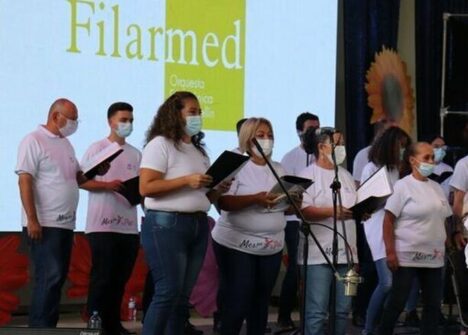
The Choir during a concert. The Reconciliation and Peace Choir was founded in 2019 at the initiative of the Philharmonic Orchestra of Medellín (Filarmed).
Thanks to Filarmed, the members of the Reconciliation and Peace Choir have left behind the label of ‘victim’ or ‘ex-combatant’ to be known only by one name. They have broken down what divided them and become witnesses to integration, becoming craftsmen of a new country, singing together for reconciliation and the wellsprings of peace. Luz Mery was one of the backing vocalists. In the choir, the harmonious notes and lyrics are a symphony, in which the voices of the former attackers join those of the victims, the former receive forgiveness and the latter feel it welling up in their hearts.
The public remains enchanted because it experiences once again that peace is possible, that hell will never be able to take over a country, no matter how loudly the weapons of the violent continue to roar, that love wins in the end, that even in the midst of the worst horror, experiences and gestures of salvation can emerge. If those responsible for the war and those who suffered it can now embrace each other, sing together, follow the same notes, it is because forgiveness has the power to dispel fear and create brotherhood.
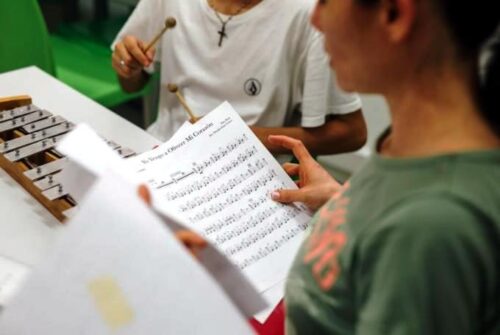
“I believe that forgiveness is possible through music”
The Philharmonic of Medellín is convinced of this. “The motto of the Medellín Philharmonic Orchestra is ‘Music for Transformation’. This is why we believe that in addition to generating beauty, which we do with our shows, we have the responsibility to contribute to transformation through music”, says Maria Catalina Prieto, executive director of Filarmed.The Reconciliation and Peace Choir is like a family where no one is stigmatized – everyone is recognized, accepted, and loved as they are – and where, especially, all make their way through the difficulties of transforming pain and resentment into another type of pain, that of giving birth to a new humanity and new ways of living.
“I believe forgiveness is possible”
One of the choristers recalls: “I came because I think it’s beautiful to sing, but I didn’t believe in forgiveness. I didn’t think I could forgive”. Three months later, the girl was able to say: “I believe that forgiveness is possible through music, and this choir taught me to forgive”. In fact, within the choir (which meets every Saturday at two in the afternoon at the Palermo Theatre in Medellín), in addition to the dynamics of integration and coexistence, breathing techniques necessary for singing are taught; deep breathing is also taught to help achieve coexistence between victims and attackers. The breathing technique changes the heart rate, lowers blood pressure, reduces stress levels, fights anxiety, reduces the sensation of pain, and changes brain chemistry, thus modifying thoughts. The lyrics of the songs are the result of conversations between victims and attackers.
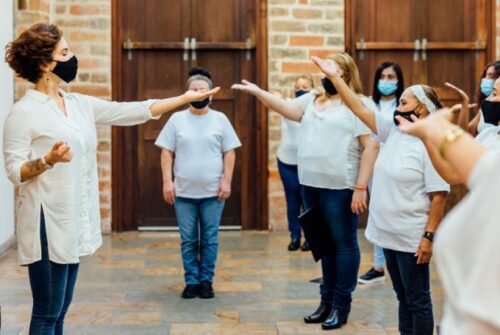
The lyrics of the songs are the result of conversations between victims and attackers.
They talk about identity and unity as a people, they refer to the need to forgive oneself and others, and they exalt the opportunity they have been given to be able to give themselves to each other.
Luz Mery Caicedo once said “They give us injections of joy”. And she said because she felt good: “I know we will be better every day”.
Jefferson is a typical example of this. “I fought in the war and now I have left all that behind me. This experience was something unique for me, something that I didn’t imagine I could experience. I feel joy, it seems to me that it is a dream come true, that people enjoy concerts with us”.
Together with him, María Isabel Palacio is one of the victims: “In less than six days, I lost my father and my brother, I also lost a nephew, I had to run away and hide twice. I was also kidnapped. But here we have found new life”.
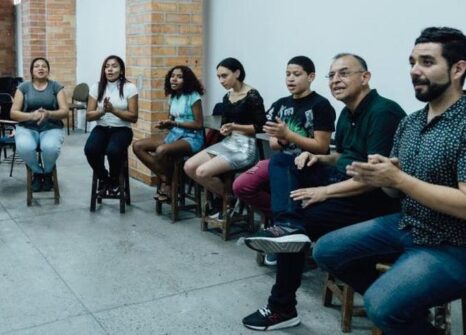
“The Reconciliation and Peace Choir is like a family where no one is stigmatized – everyone is recognized, accepted, and loved as they are”
Libertad Vargas, one of the youngest members of the choir, added: “I’m here because I like to sing, I want to support reconciliation because we all deserve a second chance, and it seems to me that people who have gone through these things don’t deserve to be rejected and it’s never too late to try again”. Just as Reconciliation evolved through coexistence since people were able to get to know each other over time, it was also something sublime to see the progress they made as a choir, says director Maria Prieto: “At the beginning they sang just one voice and very much out of tune, but now they sing with two or three voices and their repertoire has expanded”. In turn, both during rehearsals and at the end of the concerts, when the members of the Reconciliation and Peace Choir look at each other – and gaze into each other’s eyes – they all agree that music has made them more human. (Photos: Orquesta Filarmónica de Medellín)
Fernando Féliz



